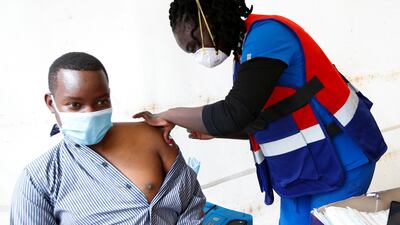The UK, EU and the US have received more doses of Covid-19 vaccines in the last six weeks than African countries have all year.
New analysis from the People’s Vaccine Alliance (PVA) — an Amnesty International-backed organisation made up of an array of non-profit, including Human Rights Watch and Oxfam — found that between November 11 and December 21, 2021, the EU, UK and US received 513 million doses of vaccines while countries in Africa received only 500 million throughout 2021.
Only 8.6 per cent of people in Africa have been fully vaccinated to date and the People’s Vaccine Alliance calculated that, at the current rate of delivery, it would take until April 2023 for everyone to receive their first dose.
In comparison, at the UK’s current vaccination rate, it would take a little more than two months to deliver a global roll-out of first doses to everyone who needs one, the campaigners said.
As Covid-19 shrouds a second Christmas season in uncertainty and fear, campaigners warn that governments risk “trapping the world in an endless cycle of variants, boosters, restrictions and even lockdowns” if low vaccination rates persist in other countries.
Supporters of global vaccine equity have criticised “rich country governments” and the pharmaceutical companies behind the Covid-19 inoculations for “blocking real solutions” by not sharing the technology with low and middle-income countries so they can manufacture vaccines themselves.
“Rich countries are banking on boosters to keep them safe from Omicron and future variants of Covid-19,” said Health Policy Manager at Oxfam, Anna Marriot.
“But boosters can never be more than a temporary and inadequate firewall. Extinguishing the threat of variants and ending this pandemic requires vaccinating the world.
“And that means sharing vaccine recipes and letting developing countries manufacture jabs for themselves.”
Both Pfizer and Moderna have refused to share the new generation of vaccine technology with the World Health Organisation's mRNA hub in South Africa. WHO scientists are now attempting to reverse engineer Moderna’s US-taxpayer-funded vaccine.
Human Rights Watch and Medecins Sans Frontieres have identified more than 100 manufacturers that could produce mRNA vaccines if intellectual property barriers were removed and pharmaceutical companies transferred the technology and know-how needed.
G7 countries will have 1.4 billion surplus doses by March 2022, even after giving all adults a booster, but are failing to deliver on donation pledges. The US has delivered only a quarter of the vaccines it promised to donate while the UK and Germany have delivered 15 per cent and 14 per cent, respectively.
The new analysis comes after WHO chief Tedros Adhanom Ghebreyesus said that “no country could booster its way out of the pandemic”.
“Blanket booster programmes are likely to prolong the Covid-19 pandemic, rather than ending it, by diverting supply to countries that already have high levels of vaccination coverage, giving the virus more opportunity to spread and mutate,” he said on Wednesday.
Meanwhile, German Health Minister Karl Lauterbach suggested a fourth Covid-19 vaccine dose would be required to protect against the Omicron variant and that the country had order 80 million doses of Omicron-specific vaccine for delivery in April or May.


